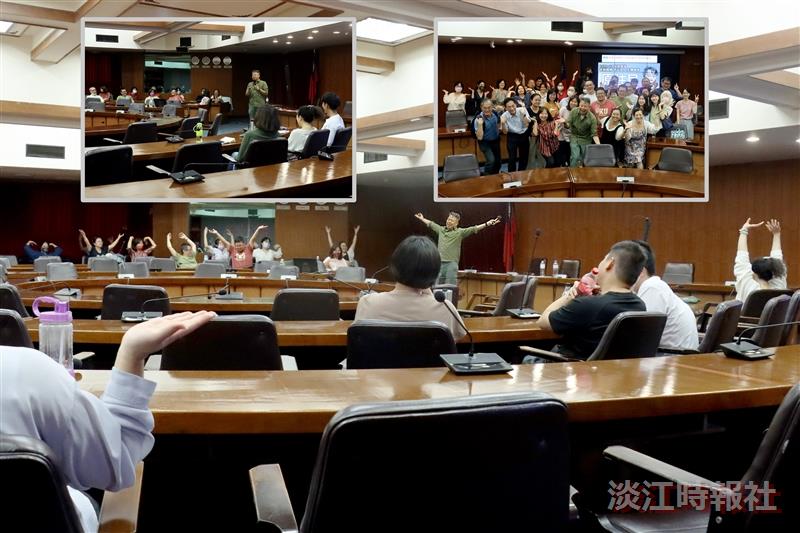News and Events
Environmental Safety Center Occupational Safety Lecture on Emotional Management & Positive Thinking
Date 2023-10-16 650 Clicks

Center for Environmental Protection, Safety and Health held the first lecture of the "Workplace Misconduct Lecture Series " on October 12th. They invited Mr. Yan-Hao Zeng, the Expression Training Director of Begin Creative and well-known Youtuber "Mr. Ou Yeah," to speak on the topic of "Emotional Management + Positive Thinking." Mr. Zeng combined the concepts of emotional management with his past counseling experiences to guide colleagues on how to reduce negative emotions and transform excessive stress into positive beliefs when facing various conflicts and work pressures. This, in turn, helps enhance work motivation. Over 50 faculty and staff members and students participated, with the event being broadcast simultaneously on Taipei campus via video.
Yan-Hao Zeng first requested participants to form groups of 2 to 3 people randomly to facilitate interaction during the lecture. He then got straight to the point, stating that when we encounter stress at work, it can trigger emotions. Managing these emotions and preventing them from becoming variables that affect our work is important. He emphasized that emotions are self-assessed, and it's crucial to be aware of them and make timely adjustments. He also reminded everyone that "before becoming aware, it's necessary to calmly detach from the present moment to facilitate subsequent adjustments." As for how to make these adjustments, he presented techniques such as "rolling your eyes," "changing your focus," "altering your breathing," and "changing your perspective in time and space" as ways to regulate emotions. In addition to explaining with practical examples, like turning your eyes to the upper right corner to enhance right-brain activity, stimulating creativity, and shifting emotions, he also used group interactions to remind everyone to empathize with their peers' emotions and offer encouragement and assistance when necessary.
Regarding positive thinking, Zeng explained that "positive thinking" means "accepting all possibilities." He outlined the 3 steps of positive thinking: "This is my feeling: Is there something I don't know or other possibilities and interpretations?" "Ask good questions: Is this issue specific and capable of providing a solution to the current situation?" and "List action options: How can I think? How can I act? How can I solve the problem to make myself feel better?" He reminded everyone to respect and acknowledge each other's feelings while understanding that feelings are "subjective ideas that vary from person to person" rather than "irrefutable, concrete, event-matching, or explicit messages or statements." As for how to ask good questions, he also recommended starting from positive perspectives, such as "WHAT: What else can I do?" and "HOW: How should I do it?" and minimizing questioning from negative perspectives like "WHY: Why me?" "WHEN: When did it happen?" and "WHO: Who did it?"
Finally, Zeng emphasized the importance of "dealing with emotions before dealing with matters." He introduced 4 levels of positive thinking sentence structures: "at least," "it's okay," "very good," and "not... but," and encouraged the participants to practice using them. He pointed out that "different thoughts will lead to different results" and hoped that everyone wouldn't always be confined by negative emotions. After all, "we can't choose how things happen, and we can't choose how others treat us," but "we can choose what kind of mood we want to have and what kind of expression we have now." He encouraged the participants to employ positive thinking and emotional management, allowing themselves to live happily and freely in both the workplace and life.
The extracurricular activity counseling section's staff member, De-Yu Chang, shared that due to the nature of his work, he often encounters and deals with various emotional issues in the workplace. He hopes to refresh his knowledge by participating in the course. "The instructor provided many practical examples during the course, which helped me understand how to better assess and manage emotions. I believe it will be of great help in handling related issues in the future."
SDGs #SDG03 Good Health and Well-Being #SDG04 Quality Education #SDG17 Partnerships for the Goals
LINKS
- PREV:TKU Co-organized AFPN9 2023-10-16
- NEXT:TKU Participates in the 2023 USR Exhibition of Engaged Scholarship, North Taiwan to Showcase the Features & Results of 5 Projects 2023-10-16
- Formosa Scholarship Donor Visits President at School 2024-04-08
- Crossing Seas for Exchange with Waseda University: Dr. Chiu-Kuei Tseng Visits Haruki Murakami 2024-04-08
- TQM Seminar: Exploring New Chapters in Leadership Wisdom and Green Practices Together 2024-03-29
- Mass Communication Alumnus Chien-Hung Lien's Work Salli Wins Award in Osaka 2024-03-25
- 256 Young and Aged Volunteers Served at the Wan Jin Shi Marathon 2024-03-25
- North Tamsui USR Project: 10 Delicacies Revive Mackay’s Missionary Journey in Taiwan 2024-03-25
- Administrative Unit Digital Transformation and Net Zero Exhibition, President Keh Acknowledge Smart Initiatives for Sustainability 2024-03-25
- 2024 Net Zero Transition Alliance Summit: Inviting Alumni Enterprises to Collaborate in Cultivating Sustainability Talents 2024-03-16
- Alumni Reunion Spring Feast: Samuel Su and Jian-Fu Li Lead Singing of School Anthem, Andy Chen Donates NT$16.25 Million 2024-03-16
- Tamkang Shines at University Expo, Faculty and Students Unite in Recruitment Efforts 2024-03-11